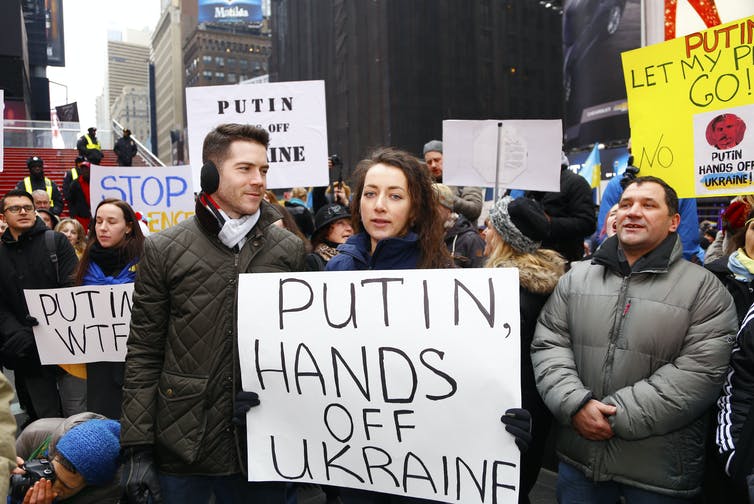MADRID – After a week of negotiations, diplomacy still has a chance. That conversation between Anthony Blinken, the United States Secretary of State, and Sergey Lavrov, the eternal Russian Foreign Minister, has opened a channel of epistolary exchange of ideas for the future of security architecture in Eastern Europe.
In times of heightened tension, exchange is good news because it allows knowing the ends, means and guarantees demanded by the parties. The Geneva talks represent a scenario of deglobalization and a realignment of international power structures.
Each actor has several cards and wants to play the winner. Because there is a conflict. Since 2014, 14,000 battle deaths have been recorded between Crimea and the Donbass. Let’s see what the arguments and starting point are in the defining week.
Russia is promoting a new international security order in which it restores the weight and legitimacy lost after the end of the Cold War. NATO’s eastern expansion is seen as a respite from spirit 1997, when relations between Moscow and NATO were renegotiated, and became a challenge to their interests.
Sense of historical injustice
Economic sanctions that have been approved by the United States or the European Union add to this sense of historical injustice. Control over the political evolution of Belarus, Georgia or Ukraine acts as a geographic security barrier and prevents the spread of arms or aid to democratization. This is the second obsession: neighbors cannot develop stable and independent democratic political regimes (gas infrastructure, outlets to the Black Sea, connections to China’s Silk Road).
Internally, the differential element is the politics of nostalgia. There is a Russophobia community in these Russian speaking countries, they were told by RT or Sputnik and they welcome this rearrangement.
This support serves to build on the Russian argument: it is not a nuisance, but rather helps those who wish to restore the legacy of the former Soviet Union. His starting position is maximalist, including NATO withdrawal from Bulgaria or Romania, and the handling of unconditional interests in the region.
The United States is not interested in leading an armed conflict. Biden-Harris Presidency Can’t Do Another Mistake from the depths of Afghanistan. The negotiating position is minimalistic. It may consider some concessions to Russia in fear that such flexibility will become a gateway for more and more claims.
Not on the table yet renegotiation Intermediate-Range Nuclear Power, which ends up being unfavorable to the parties. Is this part of the proposal? Meanwhile, prevention is being promoted on three levels. This has allowed arms shipments from the Baltic states within the framework of NATO and the first naval deployments were observed in the Black and Mediterranean Seas.
Talk, not negotiation
At the second level, economic sanctions grow, the effectiveness of which is debatable, but which makes the persecution of extractive elites clear. In short, Blinken have announced the “talks, not negotiations” they want to bring to the table of the UN Security Council.
Lastly, NATO reform is a pending issue. Jens Stoltenberg, the current secretary general, insists on getting ready and using the rhetoric of war. Stoltenberg, out of his current position, does not appear to represent the interests of all allies and silence of Germany, France or Turkey is essential.
The position of European institutions is relevant. It is feared that conflict will break out and a humanitarian disaster will repeat itself Balkans, repeated reference in recent weeks in Brussels. Without a strong voice and without ability, The European Union is in the background.
Above all, because Member States prefer to develop their own policies. Germany is hesitant, either because the new government has not set priorities and policies, or because of Russia’s overwhelming energy dependence. Polish Supporters waking from sleep and understands that Russia is pursuing EU destabilization. His recent experience on the border with Belarus was feeding eagles in Warsaw.
Outside the EU, the UK speaks eloquently of “coup” which will end the legitimacy of Ukrainian institutions, send weapons and offer training to troops. France, in the electoral process, is navigating between the isolationism of right-wing candidates and a longing for the greatness of the current president.
Ukraine, sad story
Under Macron’s leadership at Jupiter, strategic autonomy involved reducing reliance on NATO and promoting self-defense policies. Spain is committed to preventing, aligning with the United States, and promoting the vision of the Atlantic conflict.
And Ukraine? This is the sad story of this story. The state seems to be mired in a position of internal and external weakness, without the ability to assert its voice. This was overlooked partly because of President Zelensky’s internal weakness, partly because of the lack of appropriate means to articulate a defence. The latter tuits de Zelensky They took the “Russian invasion” for granted and showed their immense discomfort by negotiating in their absence.
In a moment of deglobalization, international power is a rare commodity. Therefore, any detail can make the difference between peace and war. This is still the time for diplomacy and institutions, so as not to see ourselves condemned to a humanitarian catastrophe.
He Article originally published in Conversation.
RV: EG

“Problem solver. Proud twitter specialist. Travel aficionado. Introvert. Coffee trailblazer. Professional zombie ninja. Extreme gamer.”






